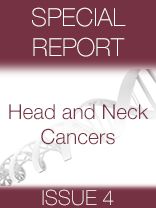Immunotherapies Gaining Traction in Head and Neck Cancers
Barbara Burtness, MD, discusses the explosion of immunotherapies on the horizon for patients with metastatic head and neck cancer.
In late January, the phase III CheckMate-141 trial investigating the antiPD-1 agent nivolumab was stopped early, due to a substantial improvement in the primary endpoint of overall survival (OS). The drug was put up against the investigator’s choice of cetuximab (Erbitux), methotrexate, or docetaxel following progression on a platinum-based therapy.
At this time, data from the study have not yet been released but are being prepared for future presentation. Findings from the study are being discussed with the FDA and other health authorities.
In addition to nivolumab, the PD-1 inhibitor pembrolizumab (Keytruda) demonstrated encouraging activity in patients with with advanced PD-L1positive esophageal carcinoma during the phase Ib KEYNOTE-028 study. Additionally, the agent was effective for patients with squamous cell carcinoma of the head and neck in the phase I KEYNOTE-012 study.
In the head and neck cancer population, the objective response rate with pembrolizumab was 24.8% in 117 evaluable patients. Tumor shrinkage was experienced by 56% of patients and another 25% had stable disease. The response rate seen with pembrolizumab was similar, regardless of HPV infection status. In those with HPV-positive disease, the ORR was 20.6% compared with 27.2% in the negative group.
To gain further insight,Targeted Oncologyspoke with head and neck cancer expert Barbara Burtness, MD, professor of Medicine (Medical Oncology), Clinical Research Program Leader, Head and Neck Cancers Program, co-director, Developmental Therapeutics Research Program, Yale Cancer Center.
TARGETED ONCOLOGY:Can you give us an overview of where immunotherapy is currently in head and neck cancer?
BURTNESS:
The first trials for immunotherapy in head and neck cancer began two or three years ago and we now have sufficient reason to believe that these therapies are going to be active in the cancer. For example, there is the KEYNOTE-012 trial, which was a trial of pembrolizumab given to an expansion cohort of either HPV-positive or HPV-negative head and neck cancer. The response rate there was about 25%.
There is some reason to believe that if either PD-L1 or PD-L2 are expressed, that that would predict for a higher response rate. There are now phase III trials going forward for both platinum-refractory disease and for first-line patients looking at pembrolizumab compared with chemotherapy.
There are also data with MEDI4736, which if a patient is expressing PD-L1, appears to have a pretty high response rate of about 50% in a small group of patients. There are currently ongoing trials looking at the combination of MEDI4736 with tremelimumab, though we don't have any data on that just yet.
Then there are novel strategies people have for trying integrate immunotherapy with standard treatment. We have some reason to believe that when head and neck cancer is treated with radiation there is upregulation in tumor-infiltrating lymphocytes and PD-L1. There are trials now moving forward that are integrating immune checkpoint inhibitors together with chemoradiation, or taking patients who have completed their chemoradiation but have persistent disease and exposing them to pembrolizumab in that setting.
The last thing is there is some evidence that siltuximab can upregulate a co-stimulatory molecule, CD137. There are some trials looking at co-targeting EGFR and CD137.
TARGETED ONCOLOGY:What are the side effects in immunotherapy?
BURTNESS:
The one thing community oncologists should be aware of is toxicities. As these drugs roll out, these toxicities that will be present are a lot different to manage than the usual cytotoxic agent toxicities. There are a lot of unusual or unexpected side effects that are autoimmune in nature.
The most common toxicity is fatigue. Across all the patients with head and neck cancer who received pembrolizumab, about 17% of them had grade 3 or 4 toxicities. This is a lot easier to tolerate than chemotherapy or chemoradiation. The other things that you might look for are pneumonitis, nephritis, pancreatitis with diabetic symptoms, thyroiditis, and a variety of unusual autoimmune side effects.
TARGETED ONCOLOGY:What do you see as the overall potential for immunotherapy in head and neck cancer?
BURTNESS:
Everybody with biomarker expression of either the ligands or the targets in this pathway is likely to be exposed to these drugs in the future. The challenge for us is going to be to figure out, for those patients who are not PD-L1 expressing or who don't have tumor-infiltrating lymphocytes, other ways that we can prime patients for immunotherapy with our standard treatments. It's speculative it's not something that people are doing in clinics now, but the first trials of those approaches are starting.
There is also ADXS11-001 that is fused to the E7 oncogene from HPV. The idea is that that would increase antigenic presentation and then the immune checkpoint inhibitor could potentially be more effective. That treatment is still in phase I.

Survivorship Care Promotes Evidence-Based Approaches for Quality of Life and Beyond
March 21st 2025Frank J. Penedo, PhD, explains the challenges of survivorship care for patients with cancer and how he implements programs to support patients’ emotional, physical, and practical needs.
Read More